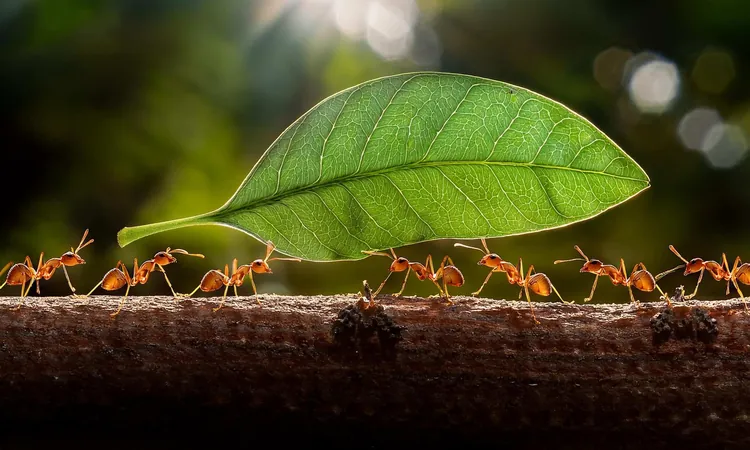
The Hidden Crisis: What if Ants Disappeared from Our Ecosystems?
2025-05-05
Author: Li
Ants are often overlooked, but these small creatures play a monumental role in maintaining ecological balance worldwide. Their significance stretches far beyond just scavenging crumbs; they are the unsung heroes of our planet's ecosystems.
In a groundbreaking study featured in Nature Ecology & Evolution, researchers from the University of Western Australia, CSIRO, and James Cook University actively explored the consequences of removing common ant species from their habitats. Their findings reveal startling insights into how ecosystems adapt, but also caution us about potential hidden costs.
Nature’s Backup Plan: Resiliency in Action
When scientists experimented by excluding three prevalent ant species—Iridomyrmex purpureus, Pheidole ampla perthensis, and Tetramorium impressum—they anticipated a serious drop in ecological functionality. Surprisingly, the ecosystem responded dynamically, with other ant species stepping up to fill the gaps.
Dr. Peter Yeeles, the lead researcher and a JCU entomologist, described this phenomenon as a built-in redundancy that grants ecosystems resilience against disturbances. It’s akin to scaffolding—remove a few pieces, and the structure remains standing, thanks to essential support from remaining elements.
Specialists Emerge: A Double-Edged Sword
However, the shift from generalist to specialist ant species introduces alarming risks. Although losing common species didn’t immediately cripple the ecosystem, it raised the stakes significantly. Specialists may maintain functions, but their narrow focus makes the ecosystem vulnerable to future disruptions. "Losing a few reliable generalists could mean relying on an unstable team of specialists," cautioned Dr. Yeeles.
The study showed that while certain functions, like seed eating, improved with diversity, others, such as plant protection, suffered due to the loss of critical ant species.
Ants: The Invisible Engineers of Our World
Ants don’t just scavenge and disperse seeds; they fundamentally shape ecosystems. Dr. Yeeles highlights their role in regulating plant communities and maintaining soil health through burrowing, which improves water infiltration. Their activities are pivotal to preventing weeds in agricultural settings and sustaining nutrient cycling.
The findings emphasize that the loss of these tiny workers could lead to noticeable detrimental shifts in ecosystems, that might not be immediately apparent but accumulate over time to disrupt entire habitats.
A Call to Action: Protect Our Silent Workers
The research paints a concerning picture amid worldwide declines in insect populations. Dr. Yeeles warns that preserving not just rare species, but also the everyday insects we often take for granted, is crucial to maintaining the intricate balance of our ecosystems.
This is more than a call to count species; it’s a plea to understand their roles and interactions—because our ecosystems are intricate machines, and ants are vital gears within that framework.
In conclusion, while ecosystems demonstrate a remarkable ability to adapt, we must tread carefully. The adjustments they make often come at the cost of increased fragility. Protecting biodiversity is imperative, not just for the rare, but for the steadfast workers who go unnoticed. Without ants, we risk tipping our delicate ecological scales into chaos.
So, let us recommit to safeguarding our ecosystems, ensuring that all workers—especially the tiny, hidden ones—can thrive.
 Brasil (PT)
Brasil (PT)
 Canada (EN)
Canada (EN)
 Chile (ES)
Chile (ES)
 Česko (CS)
Česko (CS)
 대한민국 (KO)
대한민국 (KO)
 España (ES)
España (ES)
 France (FR)
France (FR)
 Hong Kong (EN)
Hong Kong (EN)
 Italia (IT)
Italia (IT)
 日本 (JA)
日本 (JA)
 Magyarország (HU)
Magyarország (HU)
 Norge (NO)
Norge (NO)
 Polska (PL)
Polska (PL)
 Schweiz (DE)
Schweiz (DE)
 Singapore (EN)
Singapore (EN)
 Sverige (SV)
Sverige (SV)
 Suomi (FI)
Suomi (FI)
 Türkiye (TR)
Türkiye (TR)
 الإمارات العربية المتحدة (AR)
الإمارات العربية المتحدة (AR)